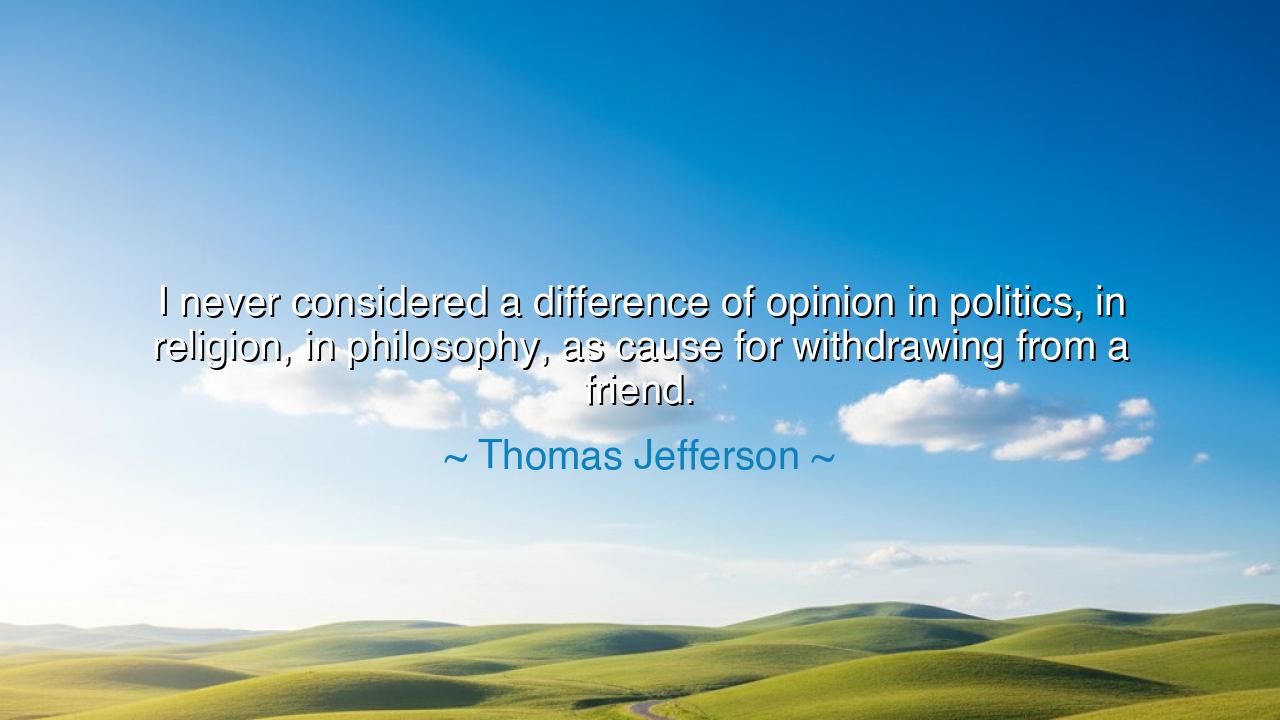
I never considered a difference of opinion in politics, in
I never considered a difference of opinion in politics, in religion, in philosophy, as cause for withdrawing from a friend.






Thomas Jefferson, the architect of liberty and philosopher of democracy, once said: “I never considered a difference of opinion in politics, in religion, in philosophy, as cause for withdrawing from a friend.” In these noble words, Jefferson reveals a truth both ancient and urgently needed in every age: that friendship is sacred above division, and that love between souls must never be sacrificed upon the altar of belief. He understood that opinions are but the garments of the mind — ever-changing, subject to time and experience — but the heart that beats in loyalty and goodwill must remain constant. The friendship of true men and women, he believed, must be strong enough to withstand the tempests of disagreement.
The origin of this saying lies in the age of revolution and enlightenment, when Jefferson himself walked among both allies and adversaries whose minds burned with differing visions for a young and uncertain nation. He was a man of conviction, yes, but also of tolerance — one who had debated fiercely with John Adams on matters of government, faith, and philosophy. Yet though their disagreements grew sharp, Jefferson never allowed the flame of friendship to die. Even when years of silence stretched between them, he spoke of Adams with respect, not bitterness. And when at last they reconciled, their letters became a testament to understanding — two old lions of the Republic, sharing wisdom rather than wounds. Such is the power of friendship that endures through difference: it refines rather than destroys.
Jefferson’s words remind us that diversity of thought is not a curse but a strength. In the marketplace of ideas, disagreement is the whetstone of wisdom. To withdraw from a friend because of opposing views is to choose comfort over growth, pride over love. The wise do not fear difference — they learn from it. For what harmony is there in a choir that sings only one note? The true symphony of human understanding is woven from contrast, not conformity. Jefferson, who studied both the philosophers of Greece and the prophets of reason, knew this deeply: that the free mind and the loving heart must coexist, or both perish together.
There is a tale from antiquity that reflects his truth. Aristotle and Plato, the teacher and the student, often clashed in their ideas of virtue and reality. Aristotle, though devoted to his master, could not agree with his concept of the ideal forms. Yet he said, “Plato is dear to me, but dearer still is truth.” And still, he never cast Plato aside. Their disagreement became not a wall, but a bridge — one philosopher building upon another’s thought, shaping the foundation of all Western wisdom to come. Thus do the great show us that difference, when met with respect, becomes the fertile soil of progress.
But Jefferson’s wisdom is not reserved for philosophers and statesmen alone. It speaks to all who live among family, community, and the world of men. How many friendships, how many loves, have withered because one could not tolerate another’s belief? How many hearts have hardened over politics, religion, or the fleeting quarrels of the day? Yet the seasons turn, and those arguments, once burning, fade to ash — while the memory of lost friendship remains as a scar upon the soul. Jefferson teaches us to cherish the person above the position, to see in every friend the same divine spark that dwells within ourselves.
True friendship, he tells us, is a discipline of the spirit. It requires patience, humility, and the courage to listen without judgment. The weak soul clings to agreement; the strong soul endures difference with grace. To remain close to one who challenges us is to practice wisdom; to love one who disagrees with us is to practice virtue. Jefferson himself, though fiercely independent in thought, held fast to the belief that civility and affection must triumph over division. For in a world where every man isolates himself behind the walls of opinion, understanding dies, and with it, the very fabric of humanity.
So let this be the lesson for all generations: do not let difference divide the heart. Seek friends not because they mirror you, but because they expand you. Debate with honor, disagree with respect, and remember always that affection is the higher truth. When next you find yourself at odds with a friend, choose to remain. Let your silence be kind, your words measured, your heart steadfast. For what matters most is not that you think alike, but that you remain united in love.
In this way, Jefferson’s words become not merely wisdom of the past, but a command for the future: to befriend even through conflict, to love even through difference, and to hold above all else the sacred bond of friendship, which, when true, can outlast both time and opinion. For ideas change as the winds of history blow — but the friendship that forgives and endures is eternal.






AAdministratorAdministrator
Welcome, honored guests. Please leave a comment, we will respond soon